
Asia Pacific Academy of Science Pte. Ltd. (APACSCI) specializes in international journal publishing. APACSCI adopts the open access publishing model and provides an important communication bridge for academic groups whose interest fields include engineering, technology, medicine, computer, mathematics, agriculture and forestry, and environment.



Issue release: 30 June, 2021
Artificial intelligence is opposed to natural intelligence. AI has the potential to handle and deal with huge volumes of data at lightning speed, then generate ideas and take action. It bridges the virtual and real. That is how AI shapes the metaverse.
Issue release: 30 June, 2021
This article is a contribution to the research on the implementation of virtual reality as a tool for teaching and learning processes, especially in the field of fundamental and professional education. For this purpose, virtual reality is analyzed as an alternative to ensure the quality of the educational process, which is particularly urgent given the current situation of physical distancing due to the pandemic. This research investigates already published works whose contributions can be considered adaptive, which have been developed and applied in fundamental and professional education environments, and which have successfully demonstrated effective results in the educational process. As a conclusion, the potential of virtual reality as an educational tool is clear for all to see, although it is not always the most appropriate, so its use must be carefully evaluated and defined.
Issue release: 30 June, 2021
Colorectal cancer (CRC) is one of the most prevalent malignant tumors in Colombia and the world. These neoplasms originate in adenomatous lesions or polyps that must be resected to prevent the disease, which can be done with a colonoscopy. It has been reported that during colonoscopy polyps are detected in 40% of men and 30% of women (hyperplastic, adenomatous, serrated, among others), and, on average, 25% of adenomatous polyps (main quality indicator in colonoscopy). However, these lesions are not easy to observe due to the multiplicity of blind spots in the colon and the human error associated with the examination. Objective: to create a computational method for the automatic detection of colorectal polyps using artificial intelligence in recorded videos of real colonoscopy procedures. Methodology: public databases with colorectal polyps and a data collection built in a University Hospital were used. Initially, all the frames of the videos were normalized to reduce the high variability between databases. Subsequently, the polyp detection task is done with a deep learning method using a convolutional neural network. This network is initialized with weights learned on millions of national images from the ImageNet database. The weights of the network are updated using colonoscopy images, following the tuning technique.
Issue release: 30 June, 2021
Artificial intelligence offers great opportunities for the supply chain, being this a competitive advantage for today’s changing market. This article aims to identify the impacts and opportunities that artificial intelligence software can offer to facilitate the operation and improve the performance of the supply chain in the banana sector in Colombia. The work methodology consists of six steps in which a total of 72 investigations were obtained. The sources of information were four databases. As a main conclusion, the supply chain of the banana sector has everything necessary for intelligent software based solutions to be implemented in order to achieve adaptation, flexibility and sensitivity to the context and domain of execution.
Issue release: 30 June, 2021
In the digital age, major changes have taken place in the field of education. All those involved in the teaching stage are invited to reflect on the challenges involved in technical literacy. The purpose of this article is to consider the cross-complexity challenges involved in technical literacy as metaverse enters the classroom. With the support of humanistic paradigm, literature research adopts philological methods, qualitative methods, exploratory interpretation types, literature design, reading technology and search tools, organization and information analysis. After two years in prison, the educational process is still utopian in the face of a technological world full of differences, prototypes, contradictions and challenges. Before existing bases are subject to the wrong dogma that technology will replace them or become their biggest enemy, the education system must be strengthened to understand the changes of prototypes. Surprisingly, the pandemic has fostered a vision of a world where it is possible to assess, reassess and give new relevance to the training process. Therefore, it is necessary to balance the beliefs of epistemology, ontology, teleology, axiology and methodology, and produce a new dialogue in the interrelated educational practice. In this dialogue, transcendence is promoted and a higher level of knowledge is achieved under the internal reflection of people in digital education.
Issue release: 30 June, 2021
This paper attempts to clarify the main economic logic of the metaverse from an economic methodology, showing that the virtual digital economic activities of the metaverse cannot be separated from the real economy, exploring the boundary between the metaverse and the real world, and suggesting that the metaverse essentially needs to be constructed by relying on the real social structure and economic logic, and that there is no consensus with its completely decentralized concept. The increase in the realistic match or realisation of the metaverse is the result of long-term social evolution, and decentralisation is not a sufficient necessary condition for the development of the metaverse, which should be based on the central bank’s digital RMB to build a metaverse financial infrastructure. This paper also discusses the current status and development path of technology applications and industrial investments for realising the metaverse. In the primary stage of the metaverse economy, infrastructure hardware and software and underlying technologies and their related applications will be prioritised for development; games and business service experience applications have more room for development, while social and other content applications are subject to personal information protection and ideological constraints and will be steadily and orderly promoted.

Prof. Zhigeng Pan
Professor, Hangzhou International Innovation Institute (H3I), Beihang University, China

Prof. Jianrong Tan
Academician, Chinese Academy of Engineering, China
Conference Time
December 15-18, 2025
Conference Venue
Hong Kong Convention and Exhibition Center (HKCEC)
...
Metaverse Scientist Forum No.3 was successfully held on April 22, 2025, from 19:00 to 20:30 (Beijing Time)...
We received the Scopus notification on April 19th, confirming that the journal has been successfully indexed by Scopus...
We are pleased to announce that we have updated the requirements for manuscript figures in the submission guidelines. Manuscripts submitted after April 15, 2025 are required to strictly adhere to the change. These updates are aimed at ensuring the highest quality of visual content in our publications and enhancing the overall readability and impact of your research. For more details, please find it in sumissions...


 Open Access
Open Access




.jpg)
.jpg)

